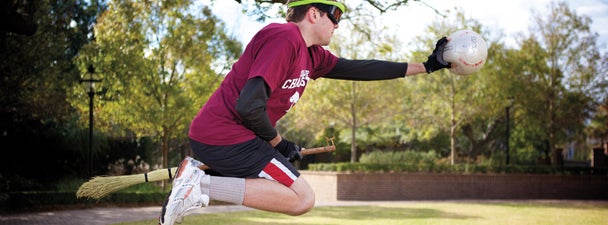
It can be easy to get carried away – especially when you’re already flying high. But, even though it soared to No. 23 in the world in its first official semester of existence, the College of Charleston Quidditch team has managed to stay grounded.
Sound a little unreal – and not just because of the team’s quick achievement? That’s because Quidditch is the fictional sport from the Harry Potter series. Played by witches and wizards atop flying broomsticks, the popular aerial sport of Harry Potter’s realm had to be brought down a level for the real world – but, ever since it was introduced at Middlebury College in 2005, Ground Quidditch (a.k.a. Muggle Quidditch) has really taken off.
Now with more than 400 college teams and 300 high school teams recognized by the Intercollegiate Quidditch Association, a self-described “magical nonprofit organization dedicated to promoting the sport of Quidditch and inspiring young people to lead more physically active and socially engaged lives,” Muggle Quidditch is becoming more and more accepted as a real, genuine sport.

The College of Charleston Quidditch Team; photo by Mike Ledford
Quidditch became a reality at the College last August, when juniors Andrew Edahl and Laurin Grabowsky established the club, which was an immediate success: More than 50 students showed up to try out for the team, which – by November – was heading to New York City to compete in the fourth annual Quidditch World Cup.
“We showed up as the ghetto team,” says Grabowsky, recalling that – although the members all pitched in to buy seven IQA-standard brooms – they didn’t have shin pads, elbow pads or the IQA-required capes. “We just had the towels we snagged from our hotel tied around our necks. We were sponsored by Super 8.”
Still, they managed to win six out of seven games, earning them the 23rd ranking – and a little respect back on campus.
“I think the brooms throw people off at first,” says Edahl, an international business major, who admits it takes most people some getting used to the idea. “Until you relate it to something people understand, like rugby or dodgeball, they think we’re a bunch of kids in capes pretending we can fly and cast spells on people – that we have stars in our eyes.”
“It’s just that it comes from Harry Potter that makes it far-fetched for people,” agrees Grabowsky, a psychology major. “If it weren’t from a book of fiction, and if it weren’t called Quidditch, it’d just be seen as a competitive sport.”
And, as far as competitive sports go, Quidditch is pretty intense.
“You’re not just frolicking around with brooms – you’re basically running at each other with two-by-fours,” says Grabowsky. “It gets really physical, because you’re just tackling one person after another – and then, once you’ve been tackled, they can pick you up and throw you.”
“It’s a chaotic, full-contact sport,” says Anthony Bishara, the psychology professor who serves as the team’s faculty adviser. “There’s a lot going on. It’s enough to entertain pretty much anyone.”
“It’s rare you look out in the audience and don’t see a grin,” agrees Edahl. “How can it not be funny to watch people run around with brooms between their legs?”
Even more fun than watching it, of course, is playing it.
“I think because you know you’re being ridiculous, it’s just so much fun,” says Grabowsky. “And it never gets old because it’s never too serious – there are no scholarships, no varsity teams.”
There is, however, a movement under way to petition the NCAA to make Quidditch a full-fledged collegiate sport – something neither Grabowsky nor Edahl endorses.
“I don’t want it to lose the silly, carefree side of it,” says Edahl. “I want to keep it fun, keep it real.”
In other words, let’s not get too carried away.




